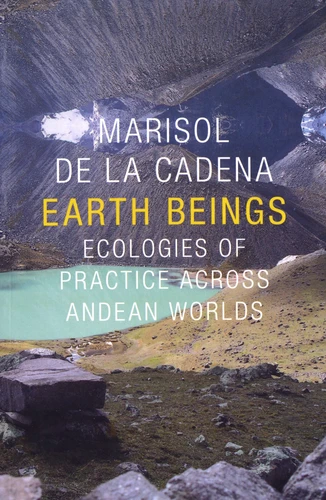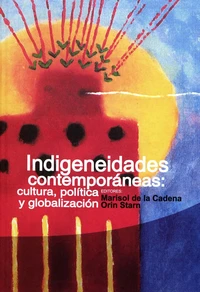Earth Beings. Ecologies of Practice Across Andean Worlds
Par :Formats :
Définitivement indisponible
Cet article ne peut plus être commandé sur notre site (ouvrage épuisé ou plus commercialisé). Il se peut néanmoins que l'éditeur imprime une nouvelle édition de cet ouvrage à l'avenir. Nous vous invitons donc à revenir périodiquement sur notre site.
- Nombre de pages340
- PrésentationBroché
- FormatGrand Format
- Poids0.489 kg
- Dimensions15,4 cm × 22,6 cm × 10,4 cm
- ISBN978-0-8223-5963-0
- EAN9780822359630
- Date de parution16/10/2015
- ÉditeurDuke University Press
Résumé
Earth Beings is the fruit of Marisol de la Cadena's decade-long conversations with Mariano and Nazario Turpo, father and son, runakuna, or Quechua people. Concerned with the mutual entanglements of indigenous and nonin-digenous worlds and the partial connections between them, de la Cadena presents how the Turpos' indigenous ways of knowing and being include and exceed modern and non modern practices.
Her discussion of indigenous political strategies—a realm that need not abide by binary logics—reconfigures how to think about and question modern politics, while pushing her readers to think beyond "hybridity" and toward translation, communication that accepts incommensurability, and mutual difference as conditions for ethnography to work.
Her discussion of indigenous political strategies—a realm that need not abide by binary logics—reconfigures how to think about and question modern politics, while pushing her readers to think beyond "hybridity" and toward translation, communication that accepts incommensurability, and mutual difference as conditions for ethnography to work.
Earth Beings is the fruit of Marisol de la Cadena's decade-long conversations with Mariano and Nazario Turpo, father and son, runakuna, or Quechua people. Concerned with the mutual entanglements of indigenous and nonin-digenous worlds and the partial connections between them, de la Cadena presents how the Turpos' indigenous ways of knowing and being include and exceed modern and non modern practices.
Her discussion of indigenous political strategies—a realm that need not abide by binary logics—reconfigures how to think about and question modern politics, while pushing her readers to think beyond "hybridity" and toward translation, communication that accepts incommensurability, and mutual difference as conditions for ethnography to work.
Her discussion of indigenous political strategies—a realm that need not abide by binary logics—reconfigures how to think about and question modern politics, while pushing her readers to think beyond "hybridity" and toward translation, communication that accepts incommensurability, and mutual difference as conditions for ethnography to work.



